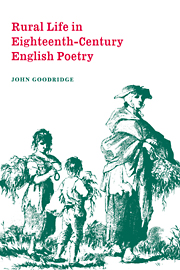Book contents
- Frontmatter
- Contents
- Preface
- Abbreviations, conventions, textual note
- Introduction
- Part I ‘Hard labour we most chearfully pursue’: three poets on rural work
- 1 Thomson, Duck, Collier and rural realism
- 2 Initiations and peak times
- 3 Three types of labour
- 4 Compensations
- 5 Homecomings
- Part II ‘A pastoral convention and a ruminative mind’: agricultural prescription in The Fleece, I
- Appendix A ‘Siluria’
- Appendix B Eighteenth-century sheep breeds
- Notes
- Select bibliography
- Index
- CAMBRIDGE STUDIES IN EIGHTEENTH-CENTURY ENGLSH LITERATURE AND THOUGHT
3 - Three types of labour
Published online by Cambridge University Press: 30 October 2009
- Frontmatter
- Contents
- Preface
- Abbreviations, conventions, textual note
- Introduction
- Part I ‘Hard labour we most chearfully pursue’: three poets on rural work
- 1 Thomson, Duck, Collier and rural realism
- 2 Initiations and peak times
- 3 Three types of labour
- 4 Compensations
- 5 Homecomings
- Part II ‘A pastoral convention and a ruminative mind’: agricultural prescription in The Fleece, I
- Appendix A ‘Siluria’
- Appendix B Eighteenth-century sheep breeds
- Notes
- Select bibliography
- Index
- CAMBRIDGE STUDIES IN EIGHTEENTH-CENTURY ENGLSH LITERATURE AND THOUGHT
Summary
Threshing
It seems clear enough that haymaking and harvesting are the kinds of labour that may include some areas of pleasure as well as pain, as all three accounts, to different degrees and in different ways, suggest. We may also distinguish between the severity of other kinds of work the three poets portray. Thomson, for example, portrays the obviously pleasurable and light work of nutting in autumn, placing it easily into a pastoral context. I want to look here, by contrast, at an activity that is clearly very hard work indeed. This is threshing, and it is the major work of Stephen Duck's annual cycle.
Threshing differs from ‘peak-time’ activities like the two harvests, or like lambing and shearing, in that it is an indoor job, and therefore is only controlled by weather to the extent that it is carried out when weather-dominated tasks are not to hand. Evans records that farmers tended to sustain the practice of hand-threshing even after threshing machines arrived, because ‘it helped to solve the problem of what to do with their workers in the winter’. It also has a far greater seasonal span, and can be done effectively at any time from the harvest to the following summer. Even if Duck were not known to posterity as the ‘thresher poet’ we could establish from its recurrence in the poem that he saw threshing as his major employment.
- Type
- Chapter
- Information
- Rural Life in Eighteenth-Century English Poetry , pp. 44 - 57Publisher: Cambridge University PressPrint publication year: 1996

